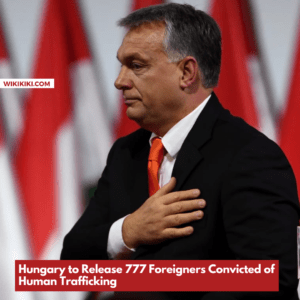Hungary recently freed 777 foreigners convicted of human trafficking. Most of those released were Serbian, Ukrainian, and Romanian nationals, as revealed by the Hungarian prison directorate. The decision was made due to overcrowding in Hungarian prisons, with Prime Minister Viktor Orban’s government issuing a decree in April that allowed the release of foreign nationals convicted of people smuggling, on the condition that they leave Hungary within 72 hours.
However, this decision has drawn protests from neighboring Austria, which considers the release of human traffickers a security threat. This article will delve into the details of Hungary’s decision, the reasons behind it, and the implications it has for both Hungary and its neighboring countries.
Also Read: James Webb Telescope Discovered Massive Water Plume on Saturn’s Moon Enceladus

Hungary’s move to release 777 foreigners convicted of human trafficking comes against the backdrop of overcrowded prisons in the country. With 2,636 people convicted of human trafficking in Hungarian prisons, the incarceration of foreign nationals has become a significant burden on the Hungarian prison system. The maintenance costs of these prisoners, especially foreign citizens, amount to billions of forints annually, as highlighted by the Hungarian prison directorate.
The decision to release these individuals aims to alleviate the strain on Hungarian prisons and mitigate the financial burden associated with their incarceration. However, the release of convicted human traffickers has been met with criticism and concern, particularly from neighboring Austria. As a top destination for smuggled migrants traveling through Hungary from the Balkans, Austria perceives the release of these individuals as a potential security threat.
Hungary’s Conditions
Under the decree issued by Prime Minister Viktor Orban’s government, foreign nationals convicted of people smuggling are eligible for release under the condition that they leave Hungary within 72 hours. This timeframe is crucial, as failure to comply with this requirement may result in those released being sent back to prison to serve the remainder of their sentence.
Also Read: South Korea’s First Same-Sex Marriage Bill Goes to Parliament
The Hungarian prison directorate emphasizes the importance of foreign nationals adhering to the 72-hour rule. By strictly enforcing this condition, Hungarian authorities aim to deter these individuals from returning to Hungary or engaging in further criminal activities. The intention is to ensure that the released convicts face the consequences of their actions if they do not respect the terms of their release.
Austrian Protests
Austria, a neighboring country of Hungary, has been vocal in its opposition to the release of human traffickers. As a prime destination for migrants seeking entry into the heart of the European Union via Hungary, Austria fears that the freed convicts may continue their illegal activities or contribute to the ongoing issue of human trafficking.
Vienna’s concern stems from the potential security implications that the release of convicted human traffickers might have. Austria has been actively involved in efforts to combat human trafficking and smuggling, and it perceives the release of these individuals as a setback in these collective efforts. The country insists that it will continue to prioritize border security and take necessary measures to safeguard its citizens and maintain stability.
Migration in Hungarian Route
Despite increased border patrols and the construction of a steel fence along Hungary’s southern border with Serbia following the 2015 migration crisis in the European Union, the Hungarian route remains appealing to migrants. Once in Hungary, migrants have relatively open borders within the Schengen zone, allowing them to continue their journey to wealthier Western European countries such as Austria and Germany.
This continued migration flow presents challenges for both Hungary and its neighboring countries. Hungary, as a transit country, faces the task of managing and controlling the movement of migrants while balancing security concerns and humanitarian obligations.
Also Read: Turkey’s Lira Plunges to Record Low as Erdogan Prepares for New Cabinet
Humanitarian Concerns
Hungary finds itself in a delicate position, needing to balance security concerns with its obligations to address the humanitarian needs of migrants. The release of foreign nationals convicted of human trafficking reflects the government’s attempt to alleviate the burden on its prison system and allocate resources more efficiently. However, it raises questions about the potential risks associated with releasing individuals involved in such criminal activities.
Critics argue that the decision to release human traffickers undermines the fight against organized crime and sends a message that Hungary is lenient toward those involved in illegal migration. They fear that this move could incentivize human traffickers and encourage further criminal activities, posing a threat to regional security and stability.
On the other hand, proponents of the decision argue that the focus should be on preventing overcrowding in prisons and exploring alternative approaches to rehabilitation and reintegration. They contend that incarcerating foreign nationals convicted of human trafficking drains significant financial resources and diverts attention from other pressing issues within the criminal justice system.
In conclusion, Hungary’s decision to release 777 foreigners convicted of human trafficking has sparked controversy and raised important questions about the balance between security concerns and humanitarian considerations. While the move aims to address the issue of overcrowded prisons and reduce the financial burden on the Hungarian correctional system, neighboring Austria’s concerns about security threats must be acknowledged and addressed through increased cooperation.
Finding a comprehensive solution to combat human trafficking requires a joint effort involving regional cooperation, international collaboration, and targeted initiatives. It is essential to focus not only on the release of convicts but also on providing rehabilitation and reintegration opportunities to prevent recidivism.
By addressing the underlying causes of human trafficking, strengthening border controls, and promoting international cooperation, Hungary and its neighboring countries can work together to combat this grave crime and protect the rights and well-being of vulnerable individuals. It is through these collective efforts that progress can be made in effectively tackling the complex challenges posed by human trafficking.
Also Read: Shanghai Records Hottest May Temperature in Over 100 Years

















+ There are no comments
Add yours